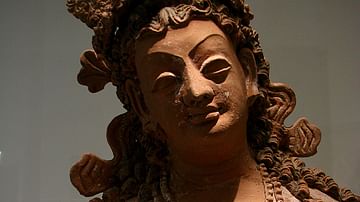Search
Did you mean: Ur?
Search Results

Video
Portraits of the Four Tetrarchs, c. 305
Portraits of the Four Tetrarchs, from Constantinople, c. 305, porphyry, 4' 3" high (St. Marks, Venice)

Video
Antonio Vivaldi - The Four Seasons
Berliner Phillharmoniker - Herbert Von Karajan. Antonio Vivaldi's violin concertos, the Four Seasons.

Video
BBC Four HD Tales of Tudor Travel The Explorer's Handbook (2018)
A remarkable travel guide compiled from first-hand records of Tudor seafarers in the 16th century. Professor Nandini Das explores Hakluyt's Principal Navigations, which records accounts of ventures in search of lucrative spices and dyes...

Video
We Are Still Here: Four Hundred Years of Wampanoag History
We Are Still Here explores 400 years of Wampanoag history and how the arrival of European colonists would forever change their way of life. While the Native American tribe on the east coast of America would form an uneasy alliance with...

Article
The Mayan Pantheon: The Many Gods of the Maya
The pantheon of the Maya is a vast collection of deities worshipped throughout the regions of Yucatan, Quintana Roo, Campeche, Tabasco, and Chiapas in Mexico and southward through Guatemala, Belize, El Salvador and Honduras. These gods informed...

Definition
Mahayana Buddhism
Mahayana Buddhism is the largest Buddhist sect in the world, and its beliefs and practices are what most non-adherents recognize as "Buddhism" in the modern era. It developed as a school of thought sometime after 383 BCE, possibly from the...

Definition
Mahasanghika
Mahasanghika (“Great Congregation”, also given as Mahasamghika) was an early Buddhist school of thought which is thought to have been formed after the Second Buddhist Council of 383 BCE when it separated itself from another school, the Sthaviravada...

Definition
Cheyenne
The Cheyenne are a North American Native nation, originally from the Great Lakes region, who migrated to modern-day Minnesota and then to areas in North Dakota and further southwest. They are associated with the Plains Indians culture and...

Article
Egyptian Gods - The Complete List
The gods and goddesses of Ancient Egypt were an integral part of the people's everyday lives for over 3,000 years. There were over 2,000 deities in the Egyptian pantheon, many whose names are well known - Isis, Osiris, Horus, Amun, Ra, Hathor...

Article
The Red Eagles
The Red Eagles is a Cheyenne hero tale featuring the popular champion Mok-so-is, the child hero best known from the legend Found in the Grass, popular among many Algonquin-speaking nations including the Cheyenne, Arapaho, and Blackfoot. The...